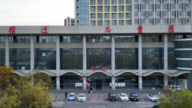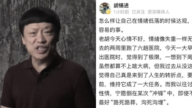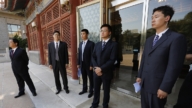【新唐人2011年11月24日讯】中共国务院法制办近期公布《机关事务管理条例》征求意见稿,其中规定县级以上政府必须定期公开“三公”支出,禁止奢侈和浪费。学者指出,根本制度不变,特权得不到遏制,一切法律条文都不能起真正作用,也不能达到真正的监督目地。
国务院法制办21号就《机关事务管理条例(征求意见稿)》征求社会意见。意见稿规定,县级以上政府应当定期公布公务接待费、公务用车购置和运行费、因公出国费等经费的预算、决算、绩效考评情况。
公务接待、公务用车和因公出国,这 “三公”的庞大政府支出,超出很多老百姓的想像。
2006年,国家行政学院教授竹立家曾在《学习时报》发文明确指出:政府部门每年的公车消费、公款吃喝、公费出国三项支出就高达9000亿元之巨。
现国务院法制办以条例形式约束三公,能起多大作用?
时评作家刘逸明认为,国务院法制办的举措,效果很有限。
刘逸明:“因为权利不受制约,所以很多人没法律意识。即使新出台遏制三公消费的规定,以后滥用公款的事情还会继续存在。因为老百姓和媒体没有监督权,而官员的权利又不是来源于老百姓,这就导致再多的规定、再好的规定都无法达到预期的效果。”
而中国问题学家巩胜利则认为,中共国务院的政策是受国际大环境的逼迫所为。现在全世界都是阳光化政府,中共政府要在国际立足,需要表面上的文章。
巩胜利:“从根源是没有办法解决的,因为中国实行的是一党领导下的政府,62年来到现在一直没有任何成效,现在一朝措施出手就改天换地恐怕就难了。党的经费开支62年从来没有公开过,政府先公开、先见阳光化,它也是做一些形式,以应付大形势吧。”
北京理工大学胡星斗教授指出,中共政府成本占总财政支出的40%左右,而在欧美国家这个比例最多也就不超过10%,这样高的政府成本必然导致民生艰难。
近年来曝出的连串事件也佐证了公款吃喝的“疯狂”:华声网友论坛2009年曝光江苏省江阴周庄医院院长一顿饭消费5586元、网友在天涯杂谈发文,2010年3月8号,东莞市中堂镇一次政府接待用餐花费32436元,并列出了账单、也有网民今年2月微博爆料:“上海市卢湾区红十字会公款一餐花费 9859元,等等几近疯狂的消费。
广西网路自由作家荆楚表示,三公消费越来越膨胀、越来越奢华,而病症在特权没有制衡,有权的人无所忌惮。媒体不开放,腐败行为得不到揭露,公众不知情,贪官更嚣张。
荆楚:“不改变官僚特权体制,以这种方式抑制三公消费没效的。最关键的问题,官员由老百姓来选,第二个是媒体放开,这些三公消费允许媒体去批评、去揭露,这样子能得到有效的抑制。”
荆楚表示,腐败已深入中共的骨髓,中共不惜杀人也得保护它的特权,保护它那掠夺老百姓的制度。
荆楚:“邓小平他们讲过这样一句话:不反腐败亡国,反腐败亡党。他们要保持共产党的特权利益,他们不愿意亡党,要保持他们对老百姓的掠夺。像6.4要求民主,他竟然用机枪坦克来对付。你想想他们内心深处有多么的恐慌,多么的邪恶。”
巩胜利也指出,中共政权下宪法要求的是:党领导下的人民代表大会,他说,这种环境只能是一党专政。而宪法不变,其他都不可能改变。
新唐人记者陈子善、宋风、柏妮采访报导。
Surface Politics: New Spending Rules for Officials
China’s State Council Legislative Affairs Office recently
published a draft bill of Government Offices Regulations (GOR).
The bill requires that local governments above the county level
must publicize its three major expenses, avoiding luxury and waste.
Scholars point out that without changing the basic system,
the privileges are not eliminated; no regulation will work nor effective monitoring system.
The State Council’s draft bill says that the government above
the county level should publicize its expenditures in three areas:
official reception costs; official vehicles purchasing costs;
operation costs, including costs associated with going abroad,
then submit a final account and evaluation of their achievement.
The costs in three areas are huge expenses for the government,
which are beyond many people’s imagination.
In 2006, Zhu Lijia published an article in the Study Times
that showed that the government spent RMB 900 billion yuan
(US$142 billion) in the three areas such as cars, meals,
and overseas visits.
The State Council tries to control costs with the GOR,
but will that work?
Commentary writer, Liu Yiming, said that
the effects will be limited.
Liu Yiming: “Because people’s rights are restricted,
many people do not have a sense of a government Constitution.
Even if new regulations are introduced,
the wild spending of public funds will continue, because civilians and the media can’t supervise officials.
However, since the official’s rights are not granted by civilians,
no matter how many regulations they make and how good they are, in the end, nothing will be achieved."
Chinese expert, Gong Shengli, believes that
the international environment forced the State Council to make
some policy changes because most of the world’s governments
are open governments.
If the Chinese Communist Party (CCP) wants to gain respect,
in the international community, they’ll do something on the surface.
Gong Shengli: “There is no way to solve fundamental problems,
as the CCP is a dictatorial regime, and as such, it its 62-year reign, it has not made even one contribution to society.
How can they change everything overnight,
by drafting the GOR? The CCP’s expenses had never been publicised in 62 years.
They’ll begin to publicize some governmental expenses,
but this is a showcase performance to the international community.
Hu Xingdou, professor of Beijing Institute of Technology,
points out that the CCP governmental cost accounts for 40% of the country’s total expenditure.
However, the European and the U.S. governmental costs
total less than 10%.
The high cost of running the CCP regime
leads to untold miseries for the civilian population.
Here are a few examples of some the officials’ use of public funds
for meals: In 2009, a Voice of Chinese user forum exposed
the fact that the head of Zhouzhuang hospital in Jiangyin
spent RMB 5,586 yuan ($879) for dinner.
Another netizen posted a bill on March 8, 2010, showing an
official reception dinner cost of RMB 32,436 yuan ($5,109) in Zhongtang county, Dongguan.
In February, a netizen posted a dinner bill of RMB 9859 yuan
($1,553) by the Shanghai Luwan district Red Cross.
Guangxi freelance Internet writer, Jing Chu, said that
officials were spending more and more public funds in three areas,
and that the leading cause was official ‘privileges’
which go unmonitored.
Those who have these privileges care about nothing else.
The media has no freedom of speech;
official’s corrupt behaviour cannot be exposed,
and the public doesn’t know the truth. These are the leading causes of corruption.
Jing Chu: “Without changing the privileged system of officials,
new regulations drafted to control the use of public funds will fail.
The most critical issue is to elect official by civilians,
and to free up the media,
allowing it to freely criticise and expose official corruption.
Then, it will work."
Jing Chu said that corruption has infiltrated the CCP.
Yet, the CCP doesn’t care to spend a dime fighting it.
They only want to protect their system and rob the people.
Jing Chu: “Deng Xiaoping said, ‘Anti-corruption
does not destroy the country; it destroys the party.’"
The CCP wants to maintain its interests, it doesn’t want to
destroy itself, it just wants to loot the people.
Like what happened in Tiananmen Square on June 4,1989,
they used guns and tanks to kill innocent people.
You can imagine how much they must fear their own evilness,
deep in the recesses of their collective warped mind.
Gong Shengli points out that the CCP’s Constitution required
that all officials must be placed under the leadership of the Party Congress.
Such a situation can only be a one-party dictatorship.
Without changing the Constitution, other areas can’t be changed.
NTD reporters Chen Zishan, Song Feng and Bo Ni.



























